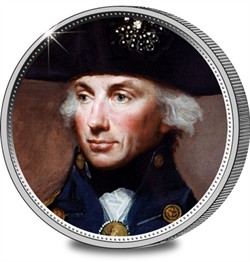
 |
Full name: Horatio Nelson
Born: 29th September 1758
Place of Birth: Burnham Thorpe, Norfolk
Occupation: British Naval Commander
Died: 21st October 1805
|
Horatio Nelson was a British Naval Commander born on 29th
September 1758 at Burnham Thorpe in Norfolk. In 1771, Nelson joined
the Royal Navy at the age of 12 on HMS Raisonable before taking
part in an arctic expedition. Nelson spent three years living
in an East Indies station before returning to England to be made
acting Lieutenant of HMS Worcester on 26th September 1776 and
lieutenant of HMS Lowestoft in 1777.
Nelson served during the war of American Independence from 1775
and 1782 and became commander of HMS Badger before becoming
post-captain, which allowed him to serve in action. In 1779,
at the age of 20, Nelson was further promoted as Captain of HMS
Hitchingbroke and was sent to Spain to attack a fort after Spain
had decided to support the American colonists.
In 1787, Nelson married Francis Nesbit but experienced a lull in
command and received only half pay for five years. Nelson was
appointed commander of the Agamemnon during the French
Revolutionary Wars in 1793 and lost sight in his right eye whilst
serving in the Battle at Calvi, a successful siege between 19th
June and 10th August 1794. Nelson helped the army to secure
Corsica from the French.
Due to Nelson's relentless determination to succeed, he
sustained 4 serious injuries during various battles. Nelson
left Agamemnon and joined the larger, HMS Captain and took a
leading role in the Battle of Cape St. Vincent in 1797, during
which, he took the ship out of line to attack a group of Spanish
ships with success and was given the rank of Colonel of
Marines.
Nelson took part in the Battle of Santa Cruz and lost his right
arm, but his relentless determination brought him victory in the
Battle of Copenhagen in 1801 and the Battle at the Nile in 1798,
during which he destroyed Napoleon's fleet. Nelson was appointed
Vice-Admiral of the Royal Navy in 1801 and was appointed to command
the Mediterranean fleet with HMS Victory. One of Nelson's
most renowned victories was the Battle at Cape Trafalgar, which
saved Britain from the threat of Napoleon but Nelson was killed by
a French Sniper during battle after famously declaring to his
fleet, 'England expects that every man will do his duty'.
Nelson was almost 47 years old when he died but had become a
national hero and was given a state funeral in Britain on the
return of his body on 9th January 1806. Nelson's
inspirational leadership and hugely successful strategies resulting
in a number of significant victories have made him one of Great
Britain's most heroic figures.